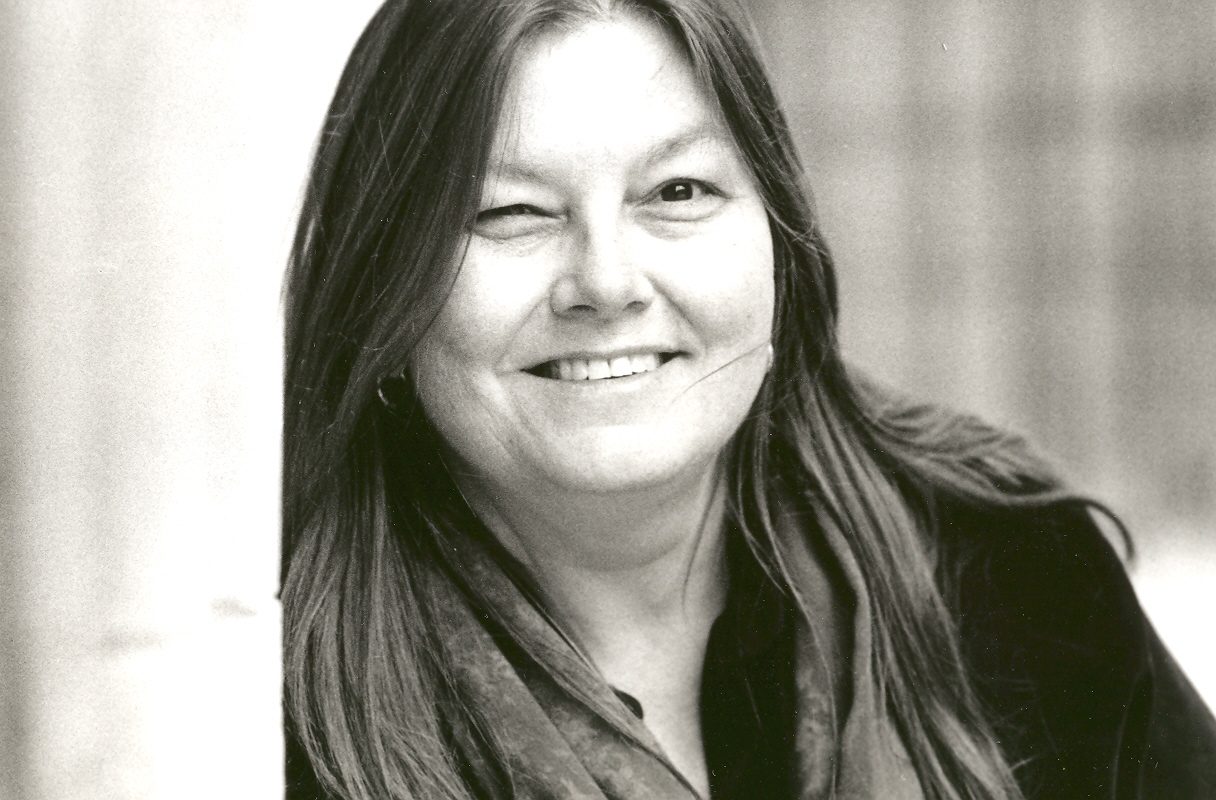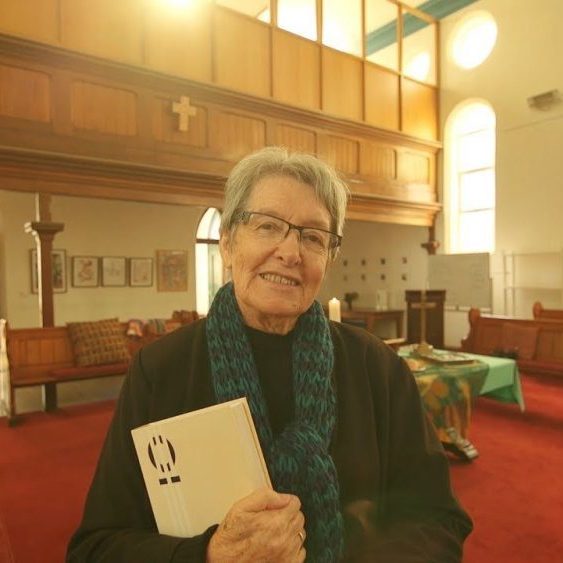
Dorothy Allison says it astonishes her when people pay attention to our stories, queer stories, working-class stories, stories of the abused, despised and disenfranchised. “The world doesn’t wanna know…it’s fucking America.”
For Allison, it is poor and reviled women of small Southern towns that beckon her. Still many of her fans want her to write stories about more familiar lesbian characters. “I’m completely aware that people would like me to write a love story. It’s just that when I write a love story you probably are not goin’ to be able to tell. I don’t believe in romance in that sense. I actually believe romance is almost as much work as raising children.”
Allison, 48, is committed to both–she has a son, Wolf, and a 10-year relationship with her partner Alix. “I’m the longest-married woman in my family. I guess it was serious when we put the rings on. I put one in her left nipple and she put one in my pussy and ever since then we felt like we owned a piece of each other.”
But her life in the Russian River area of Northern California and now San Francisco has not been the focus of Allison’s novels so far. “It’s an illusion that writers have a lot of choice about what they write,” she explains. “Your stories are your stories. They’re the only ones you can really tell, and if you try telling ones the world would like you to tell, you’ll do it badly.”
The stories that she tells so masterfully hark back to the brutality of her childhood in the rural South and the women who loved but could not protect her from her violent stepfather. Allison made that world jump off the page in her much-acclaimed, best-selling novel Bastard Out of Carolina. Her newly published novel, Cavedweller, already on the New York Times bestseller list, moves forward in time but is still very much an effort to understand the struggles of women–young and old–trying to make their way in the rural South. “I write who I can write–people I can understand. I can understand deeply wounded, hidden kinds of girls,” she says.
Delia Byrd, the main character in Cavedweller, has committed an “unforgivable sin”–she’s a mother who abandoned her children. She does not find herself in the same grinding poverty as, say, the Boatwrights in Bastard. “She has a whole lot more possibility than most working-class girls,” Allison says. “Delia’s sources of being despised are distinct from her birth.”
Despite society’s judgment, Delia attempts to earn her daughters’ forgiveness and to forgive herself. “I grew up in the Baptist South where the notion of redemption is, ‘Jesus speaks to ya heart and ya washed clean,'” she drawls. “I do not think it’s that simple. I think Jesus can speak to your heart a whole bunch and it might make no difference at all.”
A self-described Zen Baptist atheist, Allison says that her idea of redemption comes from seeing people close to her recovering from alcoholism. “I’ve watched people redeem their lives. It’s actually cleaning up behind yourself. It’s a lot of hard work and you have to do it every day. You gotta keep workin’ on it, which is how I think about Delia. Delia sets out to redeem herself. It ain’t easy. She has to pay a huge cost. She’s the cave-dweller. She buries herself alive to save her girls and it’s worth it to her. It ain’t simple.”
On the contrary, the idea that salvation comes from a single moment of divine intervention infuriates Allison. “It’s such a con job. I knew men and women who were genuinely evil, who had this little secret–on their deathbed, they would embrace Jesus and it would all be okay. It ain’t okay.”
It’s also not okay with Allison that so many poor young women don’t have a chance in this society. “I think if you look at Dede, Dede has no way out. She’s clawing at her own skin to get out of Cayro and do something, but she doesn’t have her mother’s talent. She’s not any gorgeous lil’ thing that’s going to run off an’ be Miss America. She’s just a hard-headed, practical girl, sharp enough to see how much trouble she’s in, but not sharp enough to do a whole lot about it. Dede is most of the girls I grew up with, and a piece of me. I managed a convenience store,” she laughs. “I had sharp eyes.”
A long-time feminist, Allison sees sexism as part of the problem. Dede loves to drive. “You give her a truck, she could do anything. But nobody’s going to give her a truck. Christ, I know women who would have given their teeth to have been able to drive, that was what they knew they were meant to do. And it’s only in the last few years that it’s even been possible. Most of the women long-haul drivers are married or else they’re pair-bonded with men. Sexist is not enough of a word for how that industry runs–we’re talking patriarchy of engines.”
While the world doesn’t recognize the talents of women like Dede, it’s quick to judge their shortcomings. “Dede has this little weakness of the flesh that causes her to be held in contempt–she never saw a boy she didn’t wanna try. I never saw a girl I didn’t wanna try,” Allison adds with a devilish grin.
Allison’s ardent love for women isn’t entirely left out of this novel, either. Like Bone from Bastard, the youngest daughter, Cissy, is a budding dyke, and like Bone, Cissy doesn’t understand herself or her own lesbianism. “I think one of my jobs is to show people different kinds of lesbians,” she says. In some ways, Cissy’s future beyond the end of the novel provides the greatest promise for the book. “I have this whole fantasy of Cissy going to UCLA, especially since the novel ends basically in 1991, and things are going to be so different when she finally hits California…I find that deeply satisfying.”
Allison actually wrote much more about these characters than was included in the novel, but the arc of this book is Delia and redemption, she says. When she’s finishing a book Allison totally immerses herself in writing. “I work two or three days at a stretch,” she says. “I just pull the curtains and work, but I hate being alone, so I leave the TV on with the sound off.” At the end of her work on Cavedweller, “one night, way in the middle of the night, the movie [Bastard] came on. I went up to turn it off because I can’t watch it, and instead, I wound up [turning] the sound on. It’s not as bad as I first thought.”
Allison had originally sold the rights to Bastard because she needed the money and she thought that, as people told her often happens in the industry, the movie would never be made. “This is a story that if done badly I’d had to kill somebody…the whole possibility for gratuitous violence, the eroticization of the beaten child, [which] is deeply offensive to me.”
Allison was reluctant to talk about Bastard when the film first came out because Ted Turner objected to the graphic depiction of child abuse and refused to air it on TNT, nearly preventing its release. “When the whole shit hit the fan and Ted Turner threw his little hissy fit, there was no way I was going to talk about where the movie had its shortcomings.”
Overall, Allison is generous with director Anjelica Houston’s work. “Actually, considering who she is and where she came from I think she did a damn fine job.” And she has high praise for some of the actors. “The kid was terrific and Daddy Glenn was terrific, and any movie that makes me related to Lyle Lovett is all right.”
Allison was also surprised at the passion of the people working with Houston. “I don’t think I talked to anybody in that production company that didn’t cry on me. They were just so sincere, and they loved the book so much, and \they were trying to do so good, and they didn’t have a clue where they were falling short,” she laughs.
But fall short they did. Not in the depiction of the incest–“she got that beautifully. You can’t watch that rape scene without the hair on the back of your neck comin’ up, and she did it in a way that it’s never been done before. She made it completely plain what was going on. This is not sex; this is about destroying that child.”
Where the movie failed was in its typically Hollywood, sentimental view of poverty–which is exactly the perception that Allison is trying to change. “[Houston] didn’t get the family. She didn’t understand about working-class people. In fact, she has a romantic notion of it.” A good example is the opening scene with the Boatwrights riding in a beautiful, classic ’50s car. “Where’s the one with the bumper tied on?” Allison laughs.
At one point while they were scouting for location, Houston called Allison. “She said she couldn’t believe it, ‘You go in and the women are as large as easy chairs and they have couches that have the indentations from the women’s butts.’ She should’ve shot that!” Allison exclaims. “She had to shoot all them skinny women.”
Allison was also disappointed by the large sections of the book that were omitted, including the lesbianism. “I miss desperately the parts they didn’t use. They left out all the parts where Bone has agency, where she’s not a victim. I complained about that with the script, but they didn’t get it. I kept thinking I must not’ve done the book good enough if they didn’t get it, so I’ll try harder next time.”
Despite this personal disappointment, more and more people seem to be “getting it.” As her commercial success grows and her work with Dutton continues, her view of the world has shifted. About corporate publishing, she admits, “I expected that they’d all be evil or else why are they there, and I was wrong. Some of them will look at you and only see a line on an adding sheet. How many books can she move in which market? But the people I work with on a daily basis, my editor, I adore.” The biggest surprise for her is that some of the corporate executives have actually talked with Allison about her books with real passion, she says. “It’s kind of startling. It means that what I used to believe about the world being so divided up and entrenched is not as accurate as I had thought.”
Still, Allison has not come so far from her roots that she completely trusts her success, either. She swears she won’t sell the movie rights to Cavedweller as long as she can afford not to. But she hastens to add that one never knows. “I keep it in mind that I have certain skills I can always go back to,” she says, though she confesses she can’t work as a waitress anymore. “My back’s just not strong enough, and I’m too damn old.”
One finds it hard to believe that Allison would have to go back to waitressing. Her talents are many, but perhaps it is her refusal to pay lip service to the status quo that is her greatest gift–especially for those who have felt society’s contempt because they are lower class or somehow different. “Being queer is a piece of it. And there’s all kinds of queer, not just lesbian and gay, but essentially strange, like Nolan [in Cavedweller]. He ain’t no faggot, but he’s essentially queer, and comfortable with it in a way this culture doesn’t understand–and fears.”
Her love for the stubborness and perverse determination of women who’ve had to struggle to find “a way out of no way” is validation for many. “There are only supposed to be certain people who are worth the trouble and you basically have to be middle class or exceptional in some way, really beautiful or really smart or be kissed by Jesus for god’s sake–the rest of us, we’re background noise and our stories aren’t important. And I just don’t believe that. I think the working class is the story of this country. The rich and the upper class have been riding on our asses for hundreds of years, and I don’t want to see us made over into a story that glorifies them. Our stories are glory enough.”


